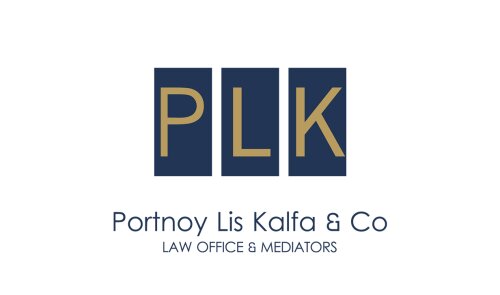Best Father's Rights Lawyers in Ashdod
Share your needs with us, get contacted by law firms.
Free. Takes 2 min.
Free Guide to Hiring a Family Lawyer
List of the best lawyers in Ashdod, Israel
About Father's Rights Law in Ashdod, Israel
Father's rights in Ashdod, as throughout Israel, refer to the legal rights and obligations that fathers have in relation to their children, especially in matters involving divorce, separation, custody, visitation (contact), child support, and parental responsibility. For many years in Israel, family law has been influenced by both civil legislation and religious courts. Traditionally, some aspects have favored mothers, particularly with young children, but recent changes have begun to reflect a shift towards a more balanced approach, emphasizing the best interests of the child and the active role of both parents.
Why You May Need a Lawyer
Engaging a lawyer is essential for fathers facing legal situations involving children or family matters. Common scenarios where fathers may require legal help include:
- Negotiating or disputing custody arrangements or visitation schedules
- Defending or modifying child support obligations
- Enforcing or amending existing court orders regarding children
- Addressing false claims of unfitness or abuse
- Relocation disputes, such as when one parent wishes to move children away
- Understanding and asserting rights in religious vs. civil courts
- Maintaining relationships with children in cases of separation or divorce
A knowledgeable lawyer can help navigate complex legal processes, represent your interests in court or negotiations, and ensure that your parental rights are protected according to Israeli and local Ashdod law.
Local Laws Overview
Family law in Ashdod is primarily governed by national Israeli legislation, such as the Law of Legal Capacity and Guardianship, and is influenced by religious court principles (especially in Jewish cases, the Rabbinical Courts). Key aspects relevant to Father's Rights in Ashdod include:
- Legal Guardianship: Both parents typically share guardianship, but custody and visitation can be divided in family or religious courts.
- Custody (Mishmaret): Traditionally, children under age 6 were presumed to stay with the mother ("Tender Years" presumption), but reforms are shifting the focus to both parents' roles and the child's best interests.
- Contact Arrangements: Fathers are increasingly granted more equal time and involvement with their children.
- Child Support (Mizonot): Child support is still mainly the father's responsibility but recent legal decisions promote a more equitable division based on both parents' income and custody arrangements.
- Religious and Family Courts: Jurisdiction may depend on religious affiliation. Jewish families in Ashdod may see cases handled by the Rabbinical Court, while others may turn to the civil Family Court.
- Enforcement: Ashdod courts have mechanisms to enforce visitation and support orders, including penalties for non-compliance.
Frequently Asked Questions
What rights does a father have after divorce in Ashdod?
Fathers have rights to custody, visitation (contact), and participation in decision-making for their children's welfare. Courts increasingly recognize the importance of ongoing father involvement after divorce, unless there are specific reasons to rule otherwise.
Is there a bias in favor of mothers when it comes to custody?
Historically, there was a "Tender Years" presumption for children under 6 to stay with the mother, but recent legal reforms and court decisions aim at reducing this bias, focusing more on the child's best interests and the involvement of both parents.
Are fathers always required to pay child support?
Fathers are generally responsible for child support, but recent reforms allow courts to consider the income and abilities of both parents, especially in cases of shared or joint custody.
Can a father obtain sole custody in Ashdod?
Yes, but it is less common. A father can be granted sole custody if it is in the best interests of the child, for instance if the mother is deemed unfit or unable to care for the child.
What if the mother wants to move away with the children?
Any significant relocation affecting visitation or custody generally requires the consent of the other parent or a court order. Courts weigh the impact on the child's relationship with both parents.
What steps should a father take if denied visitation?
A father should document the denial and file a request with the local Family Court or Rabbinical Court to enforce the visitation order. The court may intervene and impose penalties for non-compliance.
How are disputes between religious and civil courts handled?
Jurisdiction depends on the family's religious affiliation and the issues involved. A lawyer can help determine the appropriate court and guide you through the parallel systems if necessary.
Can fathers modify existing custody or support agreements?
Yes, if there has been a significant change in circumstances, either parent can ask the court to modify existing orders to better reflect the child's needs or the parents' situations.
Are mediation services available in Ashdod for family disputes?
Yes, mediation is encouraged in Ashdod family cases before resorting to litigation, and can help parents reach amicable agreements on custody, visitation, and financial support.
What role do children's preferences play in custody decisions?
Courts may consider the wishes of older children, especially as they approach adolescence, but the final decision will prioritize the child's best interests.
Additional Resources
For further help with father's rights in Ashdod, consider reaching out to the following:
- Ministry of Justice Family Court: For filing or resolving custody and support matters.
- Rabbinical Courts (Batei Din): For Jewish families, these handle many matters of divorce and child custody.
- Legal Aid Department (Siua Mishpati): Provides information and, in certain cases, free legal assistance to eligible individuals.
- Father's Rights Organizations: Non-profit groups such as "Akavish" and similar organizations offer support, counseling, and advocacy resources specifically for fathers.
- Social Services in Ashdod Municipality: For mediation, counseling, and social support related to parenting and family conflicts.
Next Steps
If you are a father in Ashdod dealing with custody, visitation, or support issues, start by documenting your situation, including all interactions, agreements, or disputes regarding your child. Consider consulting with a lawyer who specializes in family law and has experience with both the civil and religious court systems in Ashdod. Mediation can often resolve issues efficiently, but if litigation is needed, your lawyer will guide you through the necessary procedures. Do not hesitate to reach out to local resources or legal aid services. Acting quickly and seeking professional advice improve your chances of achieving the best possible outcome for you and your child.
Lawzana helps you find the best lawyers and law firms in Ashdod through a curated and pre-screened list of qualified legal professionals. Our platform offers rankings and detailed profiles of attorneys and law firms, allowing you to compare based on practice areas, including Father's Rights, experience, and client feedback.
Each profile includes a description of the firm's areas of practice, client reviews, team members and partners, year of establishment, spoken languages, office locations, contact information, social media presence, and any published articles or resources. Most firms on our platform speak English and are experienced in both local and international legal matters.
Get a quote from top-rated law firms in Ashdod, Israel — quickly, securely, and without unnecessary hassle.
Disclaimer:
The information provided on this page is for general informational purposes only and does not constitute legal advice. While we strive to ensure the accuracy and relevance of the content, legal information may change over time, and interpretations of the law can vary. You should always consult with a qualified legal professional for advice specific to your situation.
We disclaim all liability for actions taken or not taken based on the content of this page. If you believe any information is incorrect or outdated, please contact us, and we will review and update it where appropriate.









